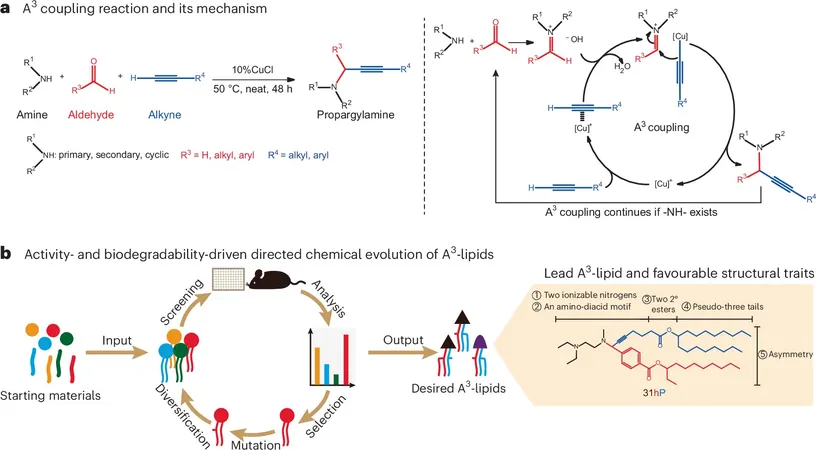
Revolutionary Breakthrough in mRNA Delivery: How Engineers Are Optimizing Lipid Nanoparticles for Enhanced Therapies
2024-11-22
Author: Li
Revolutionary Breakthrough in mRNA Delivery: How Engineers Are Optimizing Lipid Nanoparticles for Enhanced Therapies
A team of engineers at the University of Pennsylvania has made groundbreaking strides in the field of mRNA delivery, unveiling a novel method for refining ionizable lipids—the essential components of lipid nanoparticles (LNPs) that play a pivotal role in the success of mRNA vaccines, including those for COVID-19. Published in *Nature Biomedical Engineering*, this research could pave the way for more effective and safer mRNA therapies in combating various diseases.
A Culinary Approach to Science
The researchers, led by bioengineering expert Michael J. Mitchell, adopted an innovative strategy akin to perfecting a culinary recipe. Just as chefs meticulously tweak ingredients to achieve the ideal flavor profile, these engineers iteratively adjusted lipid structures to enhance their efficacy in delivering therapeutic mRNA. Traditional manufacturing methods often faced challenges balancing speed and precision; however, the new technique promises to optimize LNP characteristics significantly.
A Leap Forward in Nanoparticle Design
Lipid nanoparticles have revolutionized the delivery mechanism for mRNA-based therapies, enabling the fragile RNA molecules to traverse the body safely and release their therapeutic contents directly into targeted cells. Normally, RNA would degrade before reaching its destination without the protective casing provided by LNPs.
The study's focal point is ionizable lipids—unique molecules capable of transitioning between charged and neutral states, greatly influencing LNP efficiency. In the bloodstream, these lipids remain neutral to mitigate toxicity, and once inside target cells, they switch to a positive charge, which initiates the release of the mRNA payload.
Harnessing the Power of Directed Evolution
The Penn team created a breakthrough in lipid design by merging two different scientific methods: medicinal chemistry and combinatorial chemistry. The former method produces highly accurate but slow results, while the latter generates many variants quickly but with less precision. By employing a "directed chemical evolution" approach, the team succeeded in enhancing both speed and accuracy, optimizing the ionizable lipids through a systematic cycle of selection and refinement.
This process allows researchers to generate a myriad of lipid variants and select the most effective ones, creating a new library of high-performing, biodegradable lipids that surpass existing industry standards.
Innovative Chemistry at Work: The A3 Coupling Reaction
Central to this groundbreaking research is a three-component reaction known as A3 coupling, which involves inexpensive and widely available chemical constituents. Remarkably, this reaction produces only water as a byproduct, making it both cost-effective and environmentally sustainable.
The flexibility inherent in the A3 reaction provided researchers precise control over the lipid structures, crucial for achieving optimum properties required for mRNA delivery.
Impact on Medical Research and Treatment
The implications of this research could be immense, potentially expediting the development of a wide array of mRNA-based treatments, including therapies for genetic disorders and infectious diseases. Initial preclinical studies demonstrated the engineered lipids outperforming existing ones in enhancing mRNA delivery for high-priority applications such as gene editing for hereditary amyloidosis and optimizing COVID-19 vaccine delivery.
Traditionally, developing an effective lipid can consume years; this new method could truncate that timeline to mere weeks or months. "Our goal is to fast-track the development of mRNA therapeutics and vaccines, enabling quicker access to groundbreaking treatments for patients," expressed Mitchell.
Conclusion: Advancing mRNA Technology
As the landscape of genetic therapies evolves, lipid nanoparticles embody a vital mechanism for the safe and effective delivery of these transformative treatments. The Penn Engineers' innovative design process, rooted in precision and rapid experimentation, heralds a new era for mRNA technologies, promising to deliver life-saving solutions faster and more efficiently than ever before. This significant advancement could one day unlock new pathways for producing treatments that revolutionize health outcomes around the globe.





 Brasil (PT)
Brasil (PT)
 Canada (EN)
Canada (EN)
 Chile (ES)
Chile (ES)
 España (ES)
España (ES)
 France (FR)
France (FR)
 Hong Kong (EN)
Hong Kong (EN)
 Italia (IT)
Italia (IT)
 日本 (JA)
日本 (JA)
 Magyarország (HU)
Magyarország (HU)
 Norge (NO)
Norge (NO)
 Polska (PL)
Polska (PL)
 Schweiz (DE)
Schweiz (DE)
 Singapore (EN)
Singapore (EN)
 Sverige (SV)
Sverige (SV)
 Suomi (FI)
Suomi (FI)
 Türkiye (TR)
Türkiye (TR)